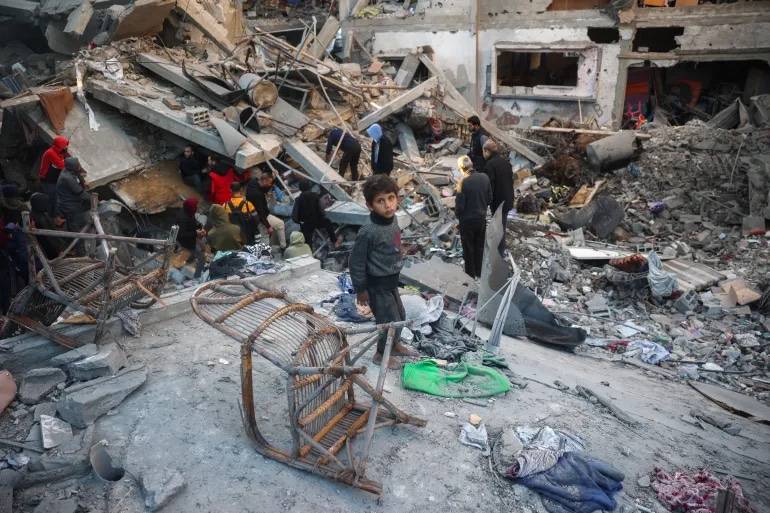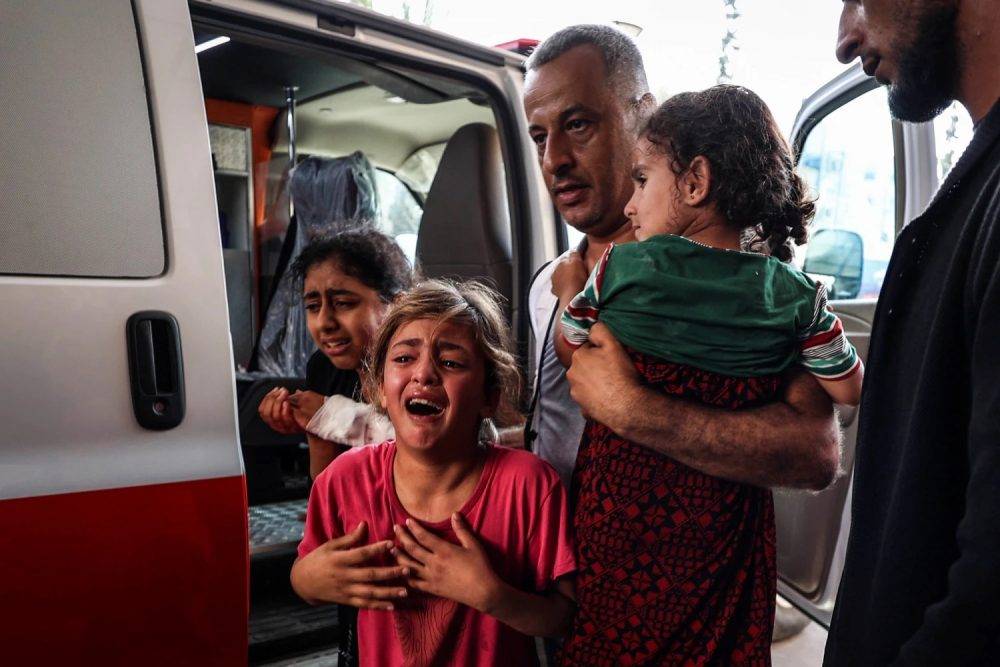
Devastation: People search the rubble of the Bureij camp for refugees in Gaza destroyed by an Israeli attack. (Eyad Baba/AFP)
News of the ceasefire between Israel and Hamas was greeted with tears of joy in Gaza and elsewhere. The courage of the people of Gaza under Israel’s genocidal terror has denied Israeli Prime Minister Benjamin Netanyahu his “total victory”. The Palestinians’ steadfastness is an astonishing example of collective courage.
As our hopes soar in relief we must be mindful that stopping the slaughter does not resolve the question of justice for the people of Palestine, or guarantee a permanent peace. Our moral obligation to work towards justice, and a just and permanent peace, is as urgent as ever.
In this moment of relief we must recall the scale of the terror unleashed on Gaza by Israel. A report published last week in The Lancet estimated that from 7 October 2023 to 30 June 2024, between 55 298 and 78 525 Palestinians died from traumatic injuries. It also found that 59% of the people killed were children, women and older people. Last year experts estimated that there are about 10 000 bodies still buried under rubble, and that when deaths from disease and starvation are taken into account, the death toll could exceed 186 000 people.
When Israel began its indiscriminate assault on the people of Gaza, as well as social infrastructure such as hospitals, schools, universities, churches and mosques, it was firmly backed by the United States and other Western governments such as Germany and the United Kingdom. Much of the Western media took the same position. The colonial assumption of a right to treat a colonised people as a whole as the enemy and to kill with impunity was in full evil bloom.
Across the world, millions of people were appalled by the brutality of the Israeli state and its backers in the West. There were many brave actions in solidarity with the Palestinian people, but the slaughter continued.
South Africa acted with courage when it initiated legal proceedings against Israel at the International Court of Justice (ICJ) on 29 December 2023, intending to show that Israel’s actions in Gaza constituted genocide against the Palestinian people. When the initial hearings at the ICJ were held on 11 and 12 January the following year, there was an extraordinary sense in much of the world that the wheel of history was beginning to turn.
The West has always justified its domination in the name of freedom while denying freedom to the colonised. It never intended the ICJ to hold all governments accountable. In May 2024, Karim Khan, the chief prosecutor of the International Criminal Court (ICC), revealed that he had been told by a senior leader, no doubt a senior figure in the Western establishment, that the court was “built for Africa and for thugs like Putin”.
Against this colonial logic, South Africa was insisting that all states be held to the same standards of conduct, and that the lives of all people be given the same value. But South Africa was isolated and the Western backlash was swift.
South Africa was condemned and threatened, and the slavishly pro-Western media at home rallied, as they always do, behind the West. Ray Hartley and Greg Mills, embedded in both the circuits of white capital at home and a set of international networks driving the Western agenda, contemptuously declared that the action at the ICJ had “exposed the African National Congress” as being “no friend of liberal values”.
This followed an old colonial script. Since the US and France moved to contain the insurgent black government formed after the revolution against slavery in Haiti in 1804, the West has often been highly effective at co-opting, intimidating, dividing, isolating, sanctioning and overthrowing governments that question its domination over much of the world. It takes courage to stand up to the West in the name of humanity.
But in the months that followed South Africa’s approach to the ICJ more and more governments, some clearly emboldened by South Africa’s courage, began to take principled positions against the genocide. These included Ireland, Cuba, Spain, Jamaica, Colombia, Chile, Brazil and Namibia. More recently, the new progressive government in Senegal has taken a strong position in support of the Palestinian people. Countries such as Belize, Honduras and Malaysia have also acted with integrity.
When, on 21 November 2024, the ICC announced it had issued arrest warrants for Netanyahu and Yoav Gallant, the former defence minister, right-wing governments around the world rushed to attack the court and express their support for the genocidal regime in Tel Aviv.

Polish Prime Minister Donald Tusk and Hungary’s Viktor Orbán both assured Netanyahu that he was free to visit their countries. Other right-wing leaders such as Javier Milei in Argentina issued strident statements of support for Israel. The UK government also expressed its support for Israel. The Austrian government declared the ICC’s decision “absurd” and “incomprehensible”. The US’s president, Joe Biden, declared the arrest warrants “outrageous”.
But a range of other governments, including Algeria, Belgium, Bangladesh, Chile, Iceland, Ireland, Cuba, Malaysia, Tunisia, Turkey, Denmark and Indonesia, either welcomed the issuing of the arrest warrants or expressed a commitment to honour the warrants.
On 9 January 2025, the US House of Representatives passed the “Illegitimate Court Counteraction Act” that aims to impose sanctions on individuals associated with the ICC who pursue investigations or prosecutions against US citizens or those of allied nations, such as Israel.
But the US and the Western governments that follow it are under pressure. The solidarity with Palestine from people around the world has been magnificent. This has included brave actions in Germany, where solidarity with Palestine is criminalised, and the wonderfully courageous actions of students across the US. Around the world, large numbers of Jewish people have joined solidarity actions.
This pressure has put the Israel and its backers in the West on the backfoot. Israel’s position has been further weakened by developments in the US. Biden was willing to be manipulated by Netanyahu at the cost of the destruction of his reputation and legacy. Donald Trump wants a ceasefire for reasons of his own.
This moment requires all possible actions to escalate the pressure against Israel and its backers. Along with popular actions we also need combined action among the many governments that have stood up to the West to declare their solidarity with the Palestinian people. Governments possess a distinct kind of power compared to street protests, encampments and boycotts, enabling them to support one another in ways that popular actions cannot.
It is time for the governments that have had the courage to stand up to the US and its allies, including their local proxies in various countries, to organise themselves as a bloc. This will enable them to offer each other mutual protection and to undertake combined and effective actions in support of Palestine.
There are a number of possibilities for collective action. For example, there could be a shared commitment to implementing the rulings of the ICC. There could also be an agreement that participating countries would support the No Harbour for Genocide campaign that aims to block the delivery of military-grade jet fuel to Israel by denying ships carrying this fuel the right to dock in harbours.
It could also be possible for participating states to enforce a full arms embargo against Israel.
The South African government enjoys the support of the vast bulk of our people for its courageous stance in support of the Palestinian people. This includes the support of the mass-based organisations that are usually critical of the ANC, such as Abahlali baseMjondolo, the National Union of Metalworkers of South Africa and the South African Federation of Trade Unions.
In the absence of organised collective action by other governments, the South African government remains vulnerable — as do other states acting in support of the Palestinian people.
There is an urgent need for collective action by governments that have taken a principled position against the brutal oppression of the people of Gaza and others.
Global solidarity with the Palestinian people, and the people of the wider Middle East, will be imperative. That solidarity will need to come from governments as well as civil society.
Ronnie Kasrils is a liberation struggle veteran and South Africa’s former minister of intelligence services.